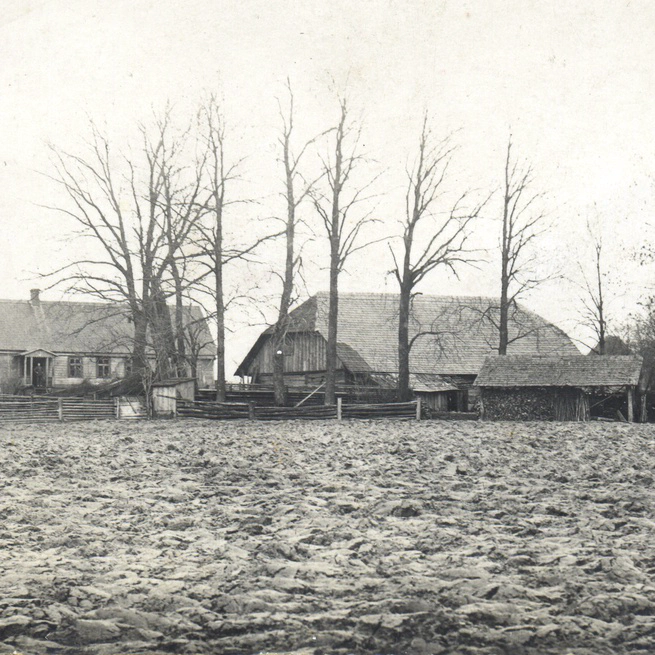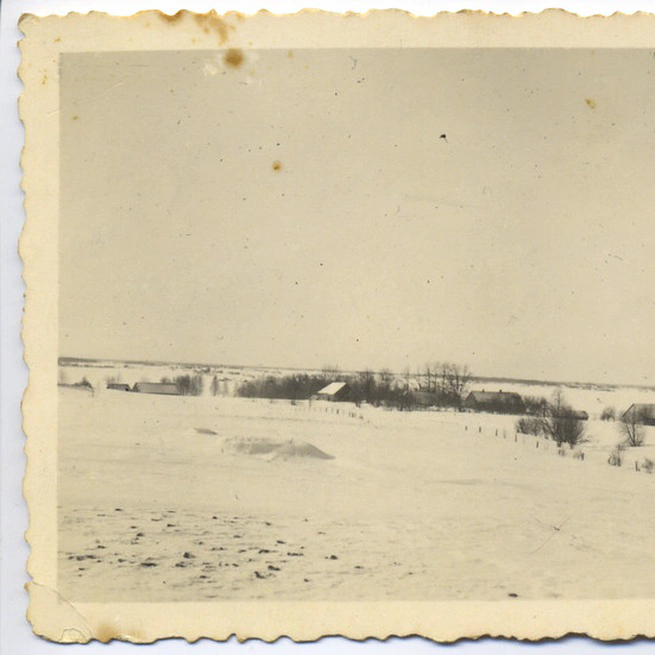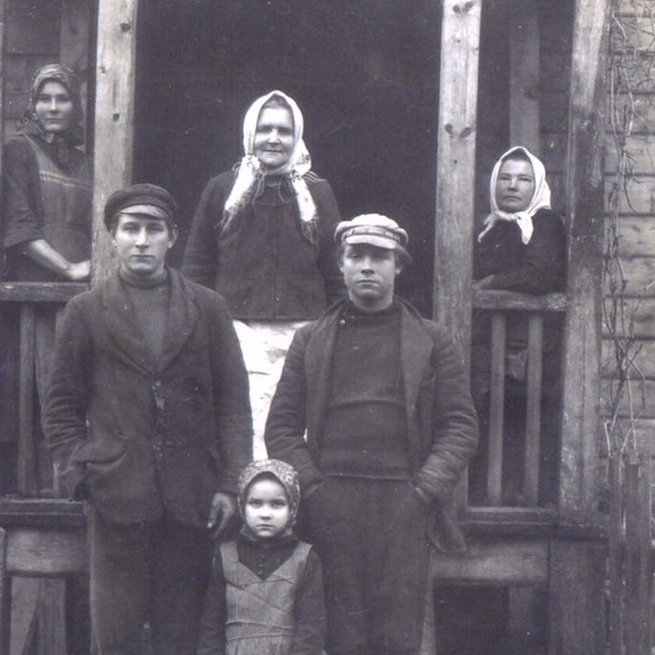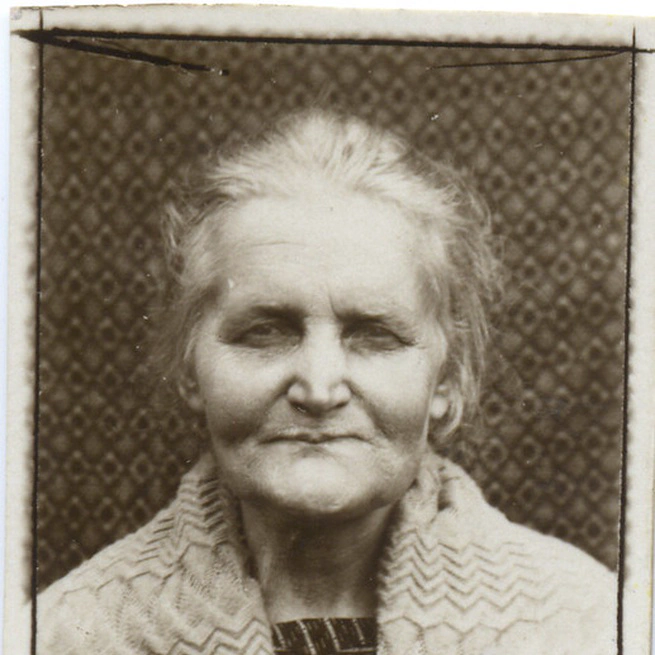
The years will pass; I will not be on this earth. My daughters, or maybe my grandchildren, may become interested in where their father, or grandfather, came from. Thus I am writing my life history.
Jan 14, 2010

As the war neared, father shut the shop. One sunny day at lunch-time father asked me to go and check on the shop to see if everything was in order – no breaking-in or stealing. I had a good look, nothing had been touched. I was just starting for home when I saw the German horse patrol with tall lances held aloft. In fright, I tried to hide behind the building but they had already seen me. They rode around the building from both sides. I was very frightened, I thought that this was my last hour because of the terrible stories that were told about the Germans. They asked – I still remember – “Russe” (“Russian?”) I just yelled that I didn’t understand. By this time the rest of the patrol had arrived; 15-20 men. “Aber here is eine kinder.” (“Here is only a child.”) They all laughed very loudly to see me so frightened with wet running down my legs. Then, the Germans, still laughing, rode away toward Kuldiga. I was very happy to be safe, having survived meeting the Germans face-to-face.
Jan 15, 2010

For the first year of the German occupation during the First World War there were no schools in the country. Somehow, a teacher who spoke German and came from the city had obtained permission to teach Latvian language and writing. She opened a school about three kilometres from our house in a very old building with low ceilings. It had tiny windows and the ceilings and walls were black in smoke. It was one, large, long room with plain tables and benches. In this room crowded fifty children of all ages eight to eighteen. We were divided in groups, the older and the younger. Even the air was hard to breathe. If someone farted and did not admit it, they were checked by sniffing down their collar and then sent out to ventilate. Around this building were wild bushes on the hillside and at the bottom of the hill there were pits where gravel was dug to repair the roads. That is where we played traditional children’s games. The school did not last long. After Christmas, a school was opened in Birze district by a teacher named Janfelds for 50-60 students. Again, it was one large room, but it was light just like a real school.
Jan 17, 2010

They started from the age of six with shepherding pigs in the yard or along the lanes where other animals were guided to the pastures. There was a fence on both sides so my sister Alvine and I just stood at each end of the lane. Time went very slowly, we had to do it for two hours. Next came the shepherding of cows and sheep. I don’t know if it was the same in other parts of Latvia as it was where we were. There were five farms with their buildings close together: Andulas, Digaini, Naglas, Vecvagari, and Zvirbuli. In the middle there was a road only for those properties with a fence along both sides so that the animals could graze along it and be directed to the pastures. The pastures started beyond Andulas. The pastures were common property from ancient times, so all the animals were herded together. The field was a square of about 1 ½ kilometres each side, mostly swampy with some water in places like small lakes. The grass was very coarse and the animals did not like it much. When the five farm animals were combined there were 50-60 cows and 200 sheep. Also, there were five shepherds, usually boys. That is where one learned how to get into trouble. There were some fights with the bigger boys teaching discipline to the younger, first-year beginners. It was the younger ones that got all the hard work – if the animals were going in the wrong direction they had to get them back. The older ones played cards or did their own thing. The younger ones couldn’t complain, it was like the Mafia of today. It was surprising how the animals, on returning to the farms in the evening, each knew to turn into their own yard. At first the calves and lambs would have to be guided. In the spring when the animals were first let out, the older cows, like people, chose a leader. The strongest took on the leadership and got respect. If the battle for leadership got dangerous, the shepherds had to separate them with a whip.
Jan 18, 2010
During 1917-1918 I remember playing war with snowballs at school; reds (communists) versus whites. During this time there was no knowledge of the terrors of the communists, they were considered as saviours from the German oppression. The school was 4-5 kilometers from our place. Three of us from the family went to school: myself, Alvine, and Arturs. In good weather we would walk home. In bad weather and in winter we would stay the night. There was sleeping accommodation upstairs on straw mattresses so close together that they touched. One end of the building was for boys and the other for girls. In the middle there was a dining room, also divided for boys and girls. The main food was rye bread with butter or smoked bacon. For breakfast we would get hot water for coffee or tea. For dinner, potatoes were boiled in a large pot. Each person’s lot was tied in a net with a named string hanging out of the pot. The school’s helper checked the parcels to see if they were cooked, and those that were ready he would put on a shelf. Usually we got them when they were already cold. There was no communal food. In the evenings after dinner for two hours, those that stayed at school went to one large class and did their homework under a teacher’s supervision and with the light from a petrol lamp. There were four teachers, each with a class. It was a Catholic school because the surrounding district was Catholic. There were only 6-7 students who were not Catholic. The Catholic Church was also nearby. A priest taught religion, and I usually stayed in class so that I could learn all the Catholic teachings. The priest would check the students for their knowledge of the texts. Because I was the only non-Catholic in the class I was not asked anything, but I often would whisper the answers when other students did not know. After the First World War there was a great shortage of teachers and country schools only went to fourth year. If you wanted to finish all six years you had to go to the district school in Aizpute.
Jan 19, 2010
To get into the school you had to do a test in mathematics and the Latvian language. I passed this test and started fifth grade. I lived with my other uncle, Gusta, who had come from Russia. In Russia he had been the manager of an estate for a Russian boss. He was very nervous. In Aizpute he had opened a shop dealing leather for clog uppers or moccasins. In his free time he also made moccasins and clogs, which he sold in the shop. There was a large room with a stove, in which I cooked my own food. I remember cooking milk soup with dumplings, or a meat soup. Most of the time I boiled water to make herb tea, without sugar of course. The usual food was fried pork and rye bread. The food was brought from Digaini every two weeks. There was no electricity in my room. I would use a small petrol lamp with paper around it to reduce the glare. I did not even have a friend; I was very lonely.
Jan 19, 2010
The next summer I was 16, no longer a shepherd. Next position – a farmhand. On the farm there was one farmhand on wages and one woman. My oldest brother Adams had taken over running the farm, even though mother owned it – she was sick a lot and was not a good manager. Adams also had control over the money. The farm work was very hard with long hours. Starting at sunrise at 4 AM, then a short break for breakfast that was carried out to the fields. From 12-2 PM we could rest, then 2-9 PM it was back to work until sunset. There was no pay for this. Summer dances were held in the open. Arturs and I waited until it was dark to sneak in without paying as we had no money. I felt very bad about this, insulted, that after a week of really hard work my brother would not give us the little money we needed for this. As autumn came I expected to go to the technical college. When I raised the subject with my brother he refused to send me to school anymore as it was too expensive. When winter came I refused to go to the forest to cut logs as my brother was spending all the money received for the summer crops on building materials which he had already collected and stored in every possible place. He though only about himself. Under the inheritance law the buildings belonged to the oldest son and the land to the other children. All along he behaved as if he owned the lot.
Jan 21, 2010
At the onset of winter I had made a gun of ½ centimetre metal pipe (using Russian cartridges.) I straightened the then end and made it a hunting gun. Powder and other things could be bought. Arturs had a real hunting rifle. That year there were a lot of squirrels; they were everywhere that firs grew, eating the seeds from the cones. The skins could be sold for 3 lati, which was a days’ pay for a labourer. By walking around the different areas I could shoot 2-4 every day, which was very good money. It was illegal to shoot them, but when it is necessary you can do anything. With my illegal earnings I saved 30-40 lati. My dream was to go to Riga and work during the day and study at night at the technical college. After Christmas I decided to do it. Until this time I did not even have an overcoat, so I had one made from a rough, home made material. I packed my belongings in a home made box like a suitcase with a lock. My belongings consisted of what mother gave me: a small cushion, a thin blanket, and one sheet. My oldest brother, after all my summer work, refused to give me anything saying, “You are just going in the world to become a thief.” I decided that I would never come home to the farm again because it could not be worse than anywhere else. At least I could always work for food.
Jan 22, 2010
One day the old landlady said that the baker downstairs was looking for an apprentice. The work was only at night, starting at 4 PM and through the night until 8 AM (16 hours.) I worked with the baker making bread rolls. They were put in the oven in one end and taken out at the other end. The rolls were put on wooden platforms, covered with a linen fabric, and put near the ceiling to rise. My job was called “smuli.” I was in a rush most of the time: grab the platforms from the ceilings, then the baker puts them on slides like very long skis, then slides them in on the stone floor in the oven. The ovens were heated before use by wood to a temperature of 30 celsius. I slept and ate during the day in a little room above that I shared with another youth from the country. The food was very good but the wages were only 10 lati a month (approx. $10AUD) I wanted to explore Riga. After breakfast I would think to go on an hours’ walk, but often returned just in time for work at 4 PM. It was very hard. I was so sleepy that as soon as I stopped moving, I fell asleep. I struggled like this for 4-5 months. Spring was coming and I decided that being a baker was not for me.
Jan 23, 2010
After 2-3 days I received a letter telling me that I was to start at Valena factory. I told the bakery boss that I was leaving for another job. He was very angry that I had exploited him, but I think it was the other way around. I had been working 16 hours a day. I was not sorry to leave the bakery; even though I had passed the winter in the warmth there and had been well-fed. At that time, after the war, there were no regulations about employment; the bosses could do as they pleased and there were no unions. Also, there were no holidays and I worked six days, except on Saturdays as there was no fresh bread on Sundays.
Jan 24, 2010